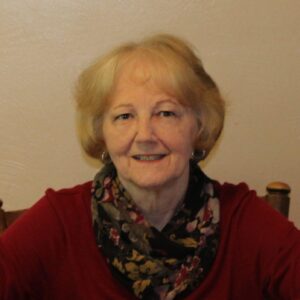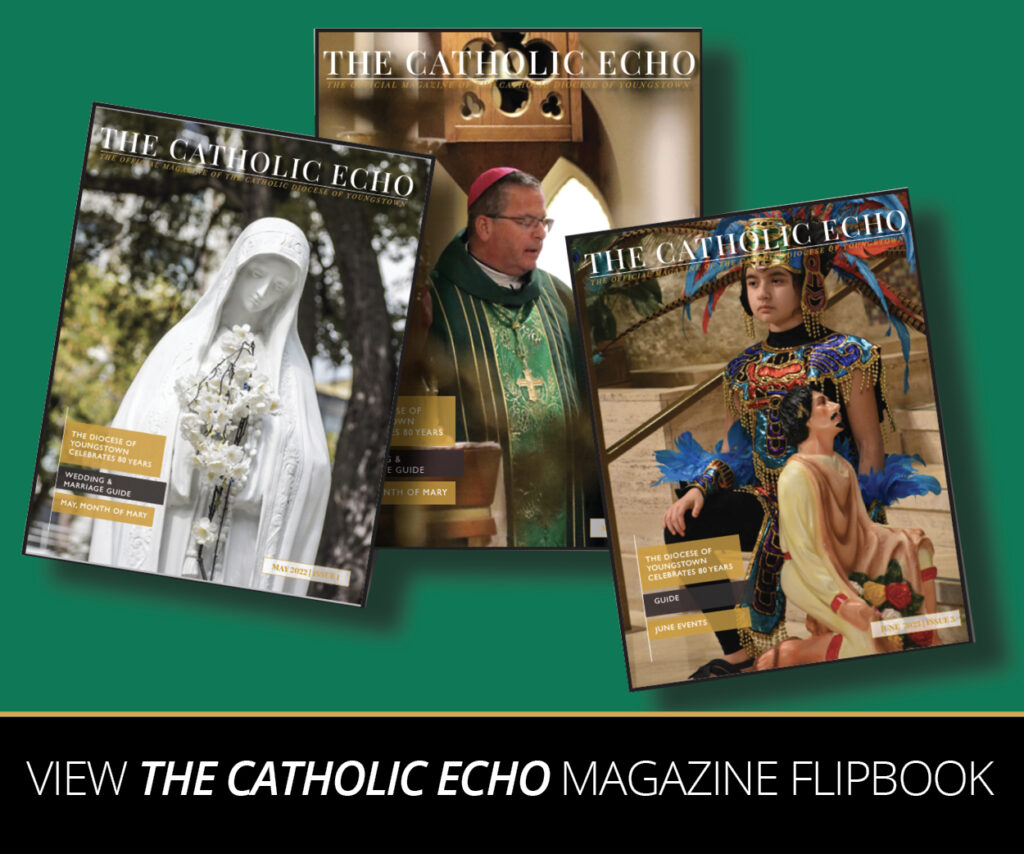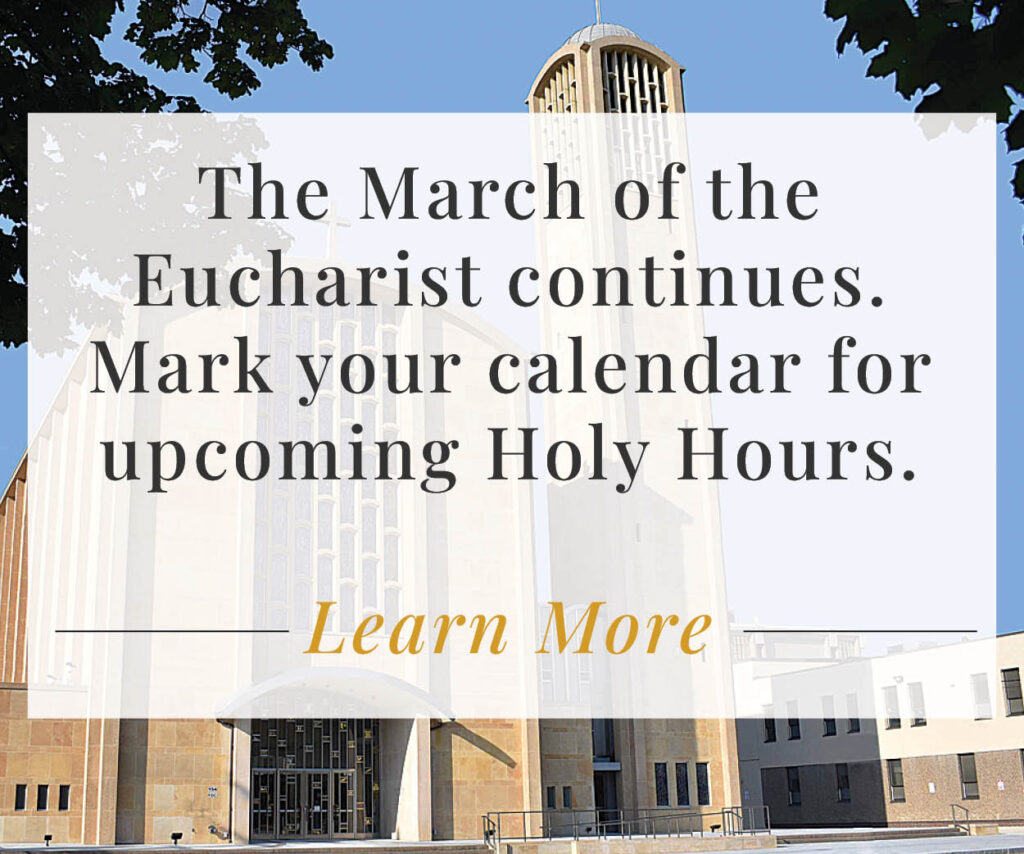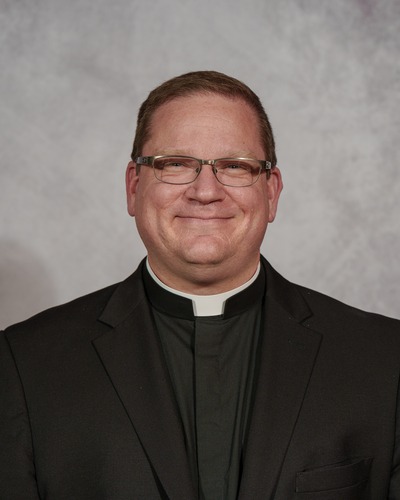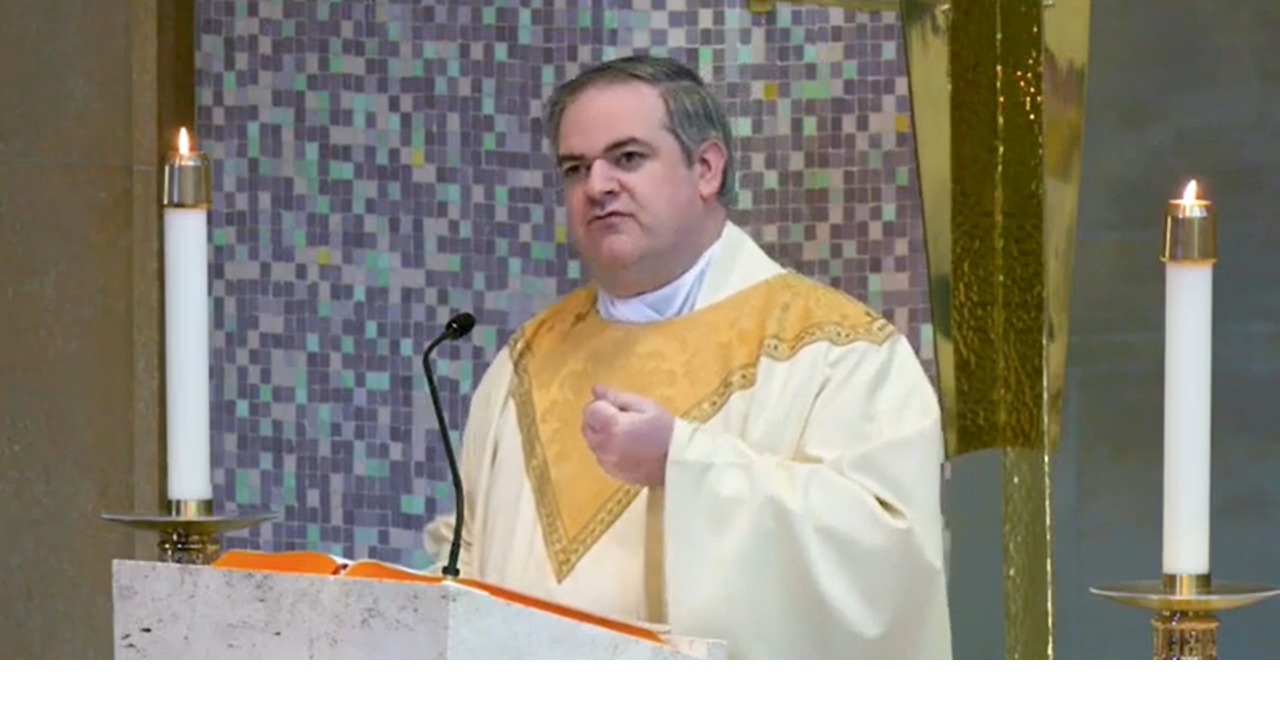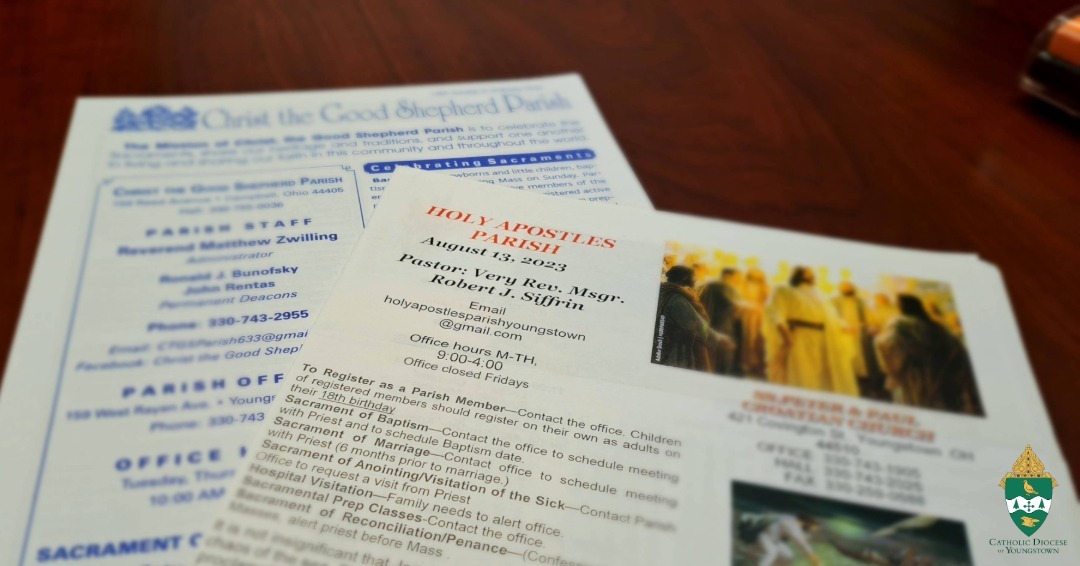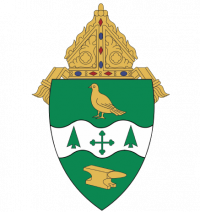Lively Spanish songs filled the air as musicians playing guitar, tambourines and maracas entered the church hall. Music opened the first annual diocesan-wide Las Posadas observance held at St. Dominic Parish in Youngstown on Saturday, December 16. Approximately 100 people, from toddlers to seniors, attended the festivities.
Creating awareness of and highlighting different faith traditions within the diocese was the evening’s theme. “In Mexico, Las Posadas is a very big celebration,” explained Cristina Hernandez, Hispanic Ministry coordinator for the Diocese of Youngstown. “We want to say to the community ‘we are one Church and all are welcome.’ Because we are one Church, we embrace the Hispanic community and this is one way we are doing that,” she continued.
Las Posadas is a religious festival that commemorates the journey that Mary and Joseph took from Nazareth to Bethlehem. The festival begins on December 16 and ends on December 24. The nightly celebrations represent the nine days Mary and Joseph searched for a safe place for Mary to give birth.
“It’s not a Christmas party. It’s to commemorate the novena. It’s like throwing a baby shower for the Blessed Virgin Mary. But we also try to provide Mary and Joseph with songs of praise, prayers and with a huge feast just like you would for a woman preparing to give birth. Posada means inn; so it’s finding a place in the inn for Mary to give birth to our Savior,” explained Dominican Father Frassati Davis, O.P., Hispanic Minister for the diocese.

The Spanish-language event usually culminates in the breaking of piñatas, which represent leaving sin to discover the light of Christ. The piñatas have seven spikes to represent the seven deadly sins: pride, envy, wrath, sloth, avarice, gluttony and lust.
“We’ve been doing this for a long time at other churches that have a Spanish Mass. The Office of Hispanic Ministry wants the Hispanic community to celebrate together and to be proud of their traditions,” Hernandez noted.
Following the music and welcomings by Hernandez and Father Frassati, attendees divided into two groups: the ones “outside,” representing Mary and Joseph, and the ones “inside,” representing innkeepers. The innkeepers remained inside the social hall while Mary [Rosemary Cintron] and Joseph [Alex Rosario], accompanied by three angels and other travelers, went into the entryway and the hall doors were closed.
The “outside” and “inside” groups recited the Posada Litany (scroll to the bottom of the page to read the litany), re-enacting Mary and Joseph’s search, until Mary and Joseph were finally “admitted” to an inn.
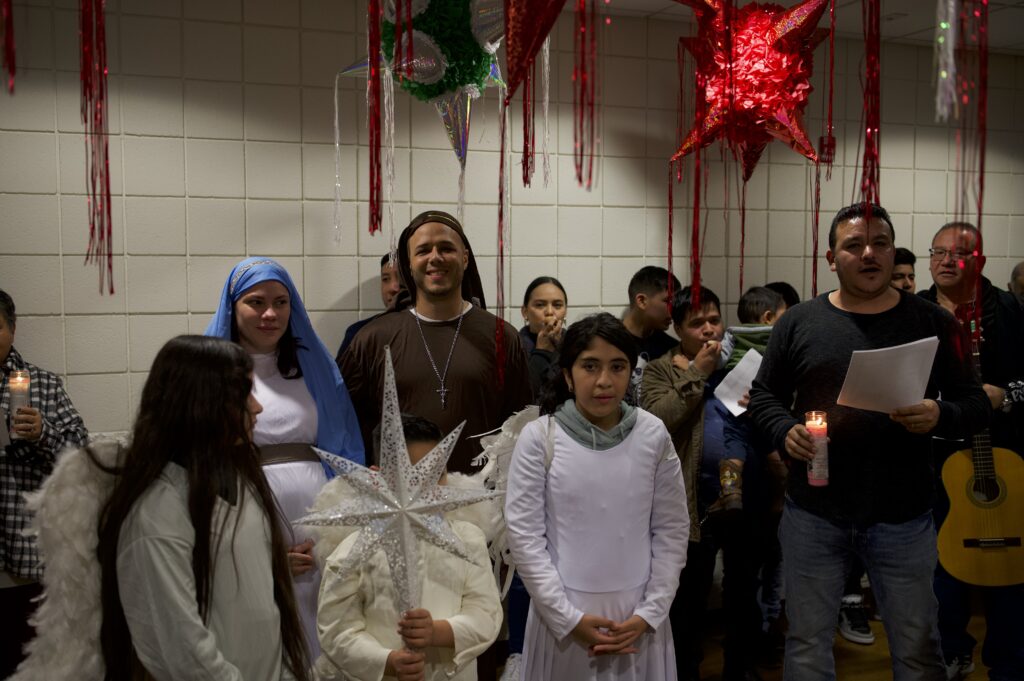
Sister of St. Francis Karen Lindenberger, coordinator of Hispanic Ministry for St. Francis of Assisi Parish in Canton, said “In the Latin-American countries, they go through the streets knocking on three different doors and the third one lets them in. That’s a little difficult to do here in Ohio in December. We have to be a little more creative in how we do it.”
Cintron and Rosario, St. Dominic parishioners, portray Mary and Joseph for the parish Christmas Eve Mass. “We’ve done this for years. We want to bring everybody joy,” they said of their reenactments in both events.
After Mary and Joseph found a place in the inn, the “outside” and “inside” participants joined together in St. Dominic church for the recitation of the rosary. Prayed mostly in Spanish, one decade of the rosary was said in the Guatemala Mayan language, k’iche—the second most widely spoken language in Guatemala.
Father Frassati then read the Gospel of Matthews’ account of the birth of Jesus (Matthew 1:18-25): “This is the Gospel that tells the dream of St. Joseph [not to divorce Mary because she was with child],” Father explained.
In his homily, Father Frassati noted that Matthew’s Gospel gives a different context to how Joseph took the Blessed Virgin Mary in his home. “We already knew Joseph was a righteous man. The Gospel, in Spanish, says he was a sensible man and he still made a decision that would have contradicted what Joseph believed should happen [to divorce Mary]. It’s a great example for us that we might think we’re sensible, and yet the Lord still calls us to something higher. He makes the sensible more sensible. Sometimes we might be content with who we are and what we’re doing in life and the Lord can call us to something higher. He can put us in a higher place, even when we think we have it all figured out,” Father Frassati proclaimed.
After prayers in church, participants returned to the social hall for a feast. “When we have Las Posadas, we share with family and the community,” Hernandez noted.
Isabel Leon, coordinator of Hispanic Ministry at Centro San Pablo at St. Paul Parish in Salem, which encompasses migrants from various Hispanic countries, said, “Mexico, Honduras, Chile and other cultures are bringing different dishes to share with the community.”
Guests were treated to a buffet that included pozole [Mexican stew made with pork and white hominy]; tamales; horchata [Mexican drink made with rice, cinnamon and hot water]; ponche [Mexican fruit punch made with pineapple, grapefruit, apple and guava]; tostadas; Mexican sweet bread; and baliada [Honduran dish of warm tortillas, beans and sour cream].
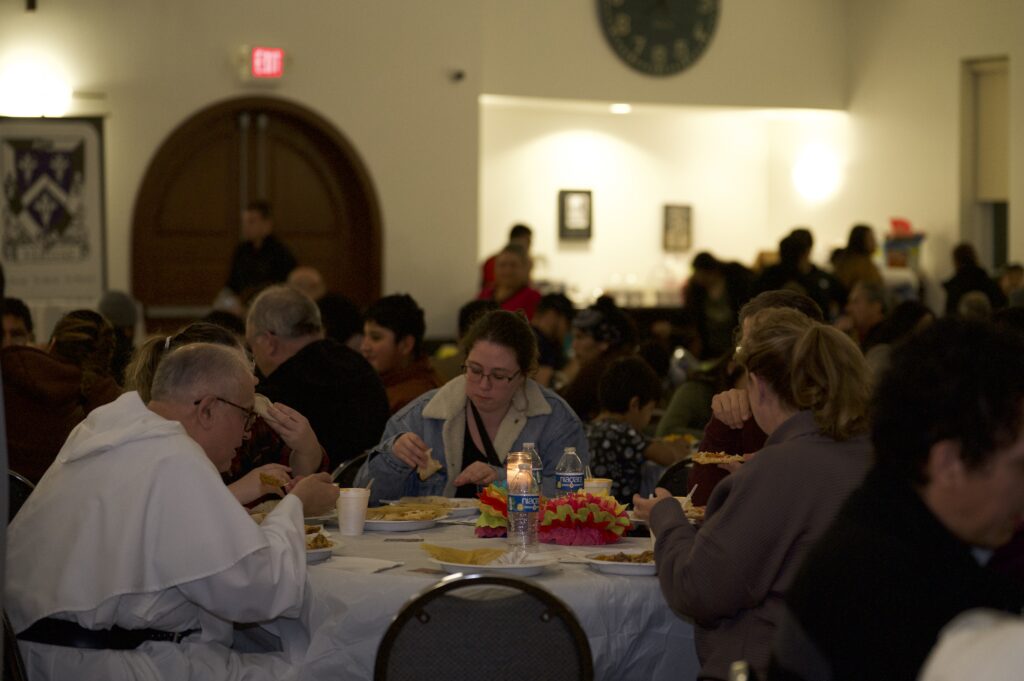
Jose and Dolores Peralta brought a treat native to their homeland. “We’re from Ecuador. Chocolate and bananas is something we do for celebrations,” the couple said.
As is traditional, the diocesan Las Posadas culminated with the breaking of the piñatas. “The piñata is the heart of Jesus. We cover our eyes because when you believe in the light of Jesus, it doesn’t matter what happens to you, you are going to follow the light of Jesus. When you break the piñata, it’s the prism that Jesus gave his heart, his love. Everything that you have in your life that is free and good, God is the one who gave it to you through Jesus,” Hernandez explained of the tradition.
While the evening concluded the first night of Las Posadas, the commemorations continued nightly in Canton, Salem, Ashtabula and Youngstown until December 24.
Father Ernesto Rodriguez, director of Ashtabula County Hispanic Ministry at Our Lady of Peace Parish said that after the December 16 event, the Ashtabula community will continue the celebration there. “It’s a way to keep alive the traditions of Mexico,” he noted.
Father Ernesto said he expected about 40 people each of the first seven nights and about 100 people on December 24. “What’s important is to remember the moment when Joseph and Mary were looking for an inn. That’s why we highlight this journey. We pray the rosary, give gifts in the form of small bags of candy for the children and after the meal we break the piñata,” Father Ernesto remarked.
Sister Karen said participants in Canton will also gather every night at St. Anthony Church, as well as in some private homes. “For the church celebrations, each night a different group plans the songs, prayers, and food. We have Hondurans, Guatemalans, Mexicans, Salvadorans. Each country has a little bit of a different menu they will bring to the nightly celebration. That shared responsibility is wonderful,” said Sister Karen.
She said having a diocesan-wide event was wonderful because “Las Posadas is done a little bit differently in every culture. It makes it richer to have the variety of celebrations.”
The educational component of the December 16 observance was important for Hernandez because “learning about other cultures’ celebrations and traditions is very important for me as a diocesan coordinator.”
Paulina Montaldo, Spanish teacher at Ursuline High School and a member of the diocesan pastoral council on Hispanic Ministry, said she encouraged her students to come to the first annual Las Posadas to “learn not only the language but also the culture.”

Originally from Chile, Montaldo wore a Mexican dress to honor the event. “After ten years of teaching, it is wonderful to see the Hispanic ministry in the diocese come to fruition,” she added.
Among the Ursuline Spanish students attending the event were Alex Miller and Michael Greenwalt. “Senora Montaldo encourages us to learn about what different cultures do for Christmas. So, Las Posadas is part of her heritage. The Spanish classes have come to Mass here [at St. Dominic Parish] and now to this event,” they said.
Jacki Miller, Alex Miller’s mother, commented, “Everyone here is so welcoming. I was raised Catholic and never knew about this celebration. We’re here to learn about the culture.”
St. Dominic parishioner Augustine Cintron was part of the planning committee for Las Posadas. “Father [Frassati] told us what he needed help with, and we did it. St. Dominic Parish is the place for the first annual celebration. Next year, there will be one at another parish,” Cintron stated.
Carmelo LeBron, originally from Puerto Rico, said, “Everybody has a time for local celebrations, but this is the first diocesan one. All the community is coming together tonight. We’re excited about tonight.”
Maria Ziegler, a native of the Dominican Republic, has never been to a Las Posadas celebration before. “I was a member of St. Lucy Parish [in Campbell] and now I belong to St. Dominic. I started coming to St. Dominic for the Spanish Mass and I wanted to come to learn about Las Posadas,” she commented.
Throughout Mexico, churches and communities still celebrate these festivities with their traditional, religious elements. Today almost any party held around Christmas [in Mexico] is called a posada.
La Diócesis Celebra Las Posadas en la Parroquia de Santo Domingo
Animadas canciones en español llenaron el aire mientras músicos tocando guitarra, panderetas y maracas entraban al salón de la iglesia. La música abrió la primera celebración anual diocesana de Las Posadas que se llevó a cabo en la parroquia de Santo Domingo en Youngstown el sábado 16 de diciembre. Aproximadamente 100 personas, desde niños pequeños hasta personas mayores, asistieron a las festividades.
El tema de la noche fue crear conciencia y resaltar las diferentes tradiciones religiosas dentro de la diócesis. “En México, Las Posadas es una celebración muy grande”, explicó Cristina Hernández, coordinadora del Ministerio Hispano de la Diócesis de Youngstown. “Queremos decirle a la comunidad ‘somos una Iglesia y todos son bienvenidos’. Porque somos una Iglesia, abrazamos a la comunidad hispana y esta es una forma en que lo estamos haciendo”, continuó.
Las Posadas es una celebración religiosa que conmemora el viaje que María y José hicieron desde Nazaret a Belén. La celebración comienza el 16 de diciembre y termina el 24 de diciembre. Las celebraciones nocturnas representan los nueve días que María y José buscaron un lugar seguro donde ella diera a luz.
“No es una fiesta de Navidad. Es para conmemorar la novena. Es como dar un baby shower para la Santísima Virgen María. Pero también tratamos de dar a María y José cantos de alabanza, oraciones y una gran fiesta tal como lo harías para una mujer que se prepara para dar a luz. Posada significa un lugar donde quedarse; entonces se trata de encontrar un lugar para que María dé a luz a nuestro Salvador”, explicó el Padre dominico Frassati Davis, O.P., ministro del Ministerio Hispano la diócesis.
El evento de habla hispana suele culminar quebrando piñatas, lo cual representa dejar el pecado para descubrir la luz de Cristo. Las piñatas tienen siete puntas que representan los siete pecados capitales: soberbia, envidia, ira, pereza, avaricia, gula y lujuria.
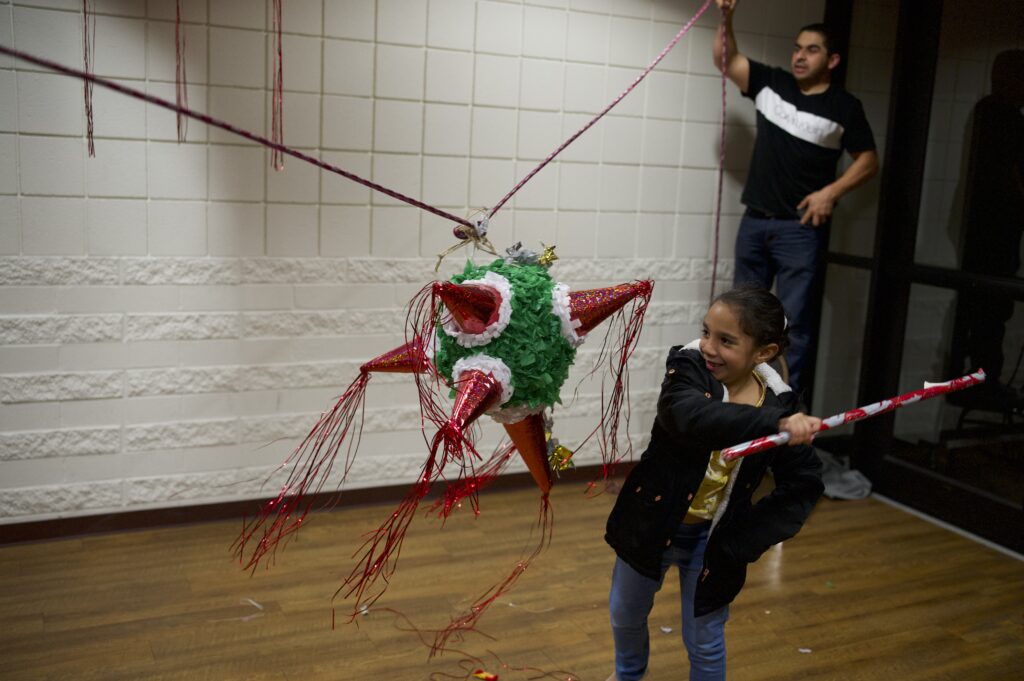
“Hemos estado haciendo esto por un largo tiempo en otras iglesias que tienen misa en español. La Oficina del Ministerio Hispano quiere que la comunidad hispana celebre junta y que esté orgullosa de sus tradiciones,” acotó Hernandez.
A continuación de la música y la bienvenida de Hernandez y el Padre Frassati, los asistentes se dividieron en dos grupos: los de “afuera”, que representan a María y José, y los de “adentro”, que representan a los posaderos. Los posaderos permanecieron dentro del salón social mientras María [Rosemary Cintrón] y José [Alex Rosario], acompañados por tres ángeles y otros viajeros, ingresaron por la entrada y se cerraron las puertas del salón.
Los grupos “de afuera” y “de adentro” recitaron la Letanía de la Posada (vaya al final de la página para leer la letanía), recreando la búsqueda de María y José, hasta que María y José finalmente fueron “admitidos” en una posada.
La Hermana de San Francisco, Karen Lindenberger, coordinadora del Ministerio Hispano de la Parroquia San Francisco de Asís en Canton, dijo que “En los países latinoamericanos van por las calles tocando tres puertas diferentes y la tercera les deja entrar. Eso es un poco difícil de hacer aquí en Ohio en diciembre. Tenemos que ser un poco más creativos en cómo lo hacemos”.
Cintrón y Rosario, feligreses de Santo Domingo, representan a María y José para la parroquia durante la Misa de Nochebuena. “Hemos hecho esto por años. Queremos traer alegría para todos,” dijeron al referirse a su participación en los dos eventos.
Después de que María y José encontraran un lugar en la posada, los participantes “de afuera” y “de adentro” se reunieron en la iglesia de Santo Domingo para rezar el rosario. Rezado principalmente en español, una década del rosario se rezó en el idioma maya de Guatemala, k’iche, el segundo idioma más hablado en Guatemala.
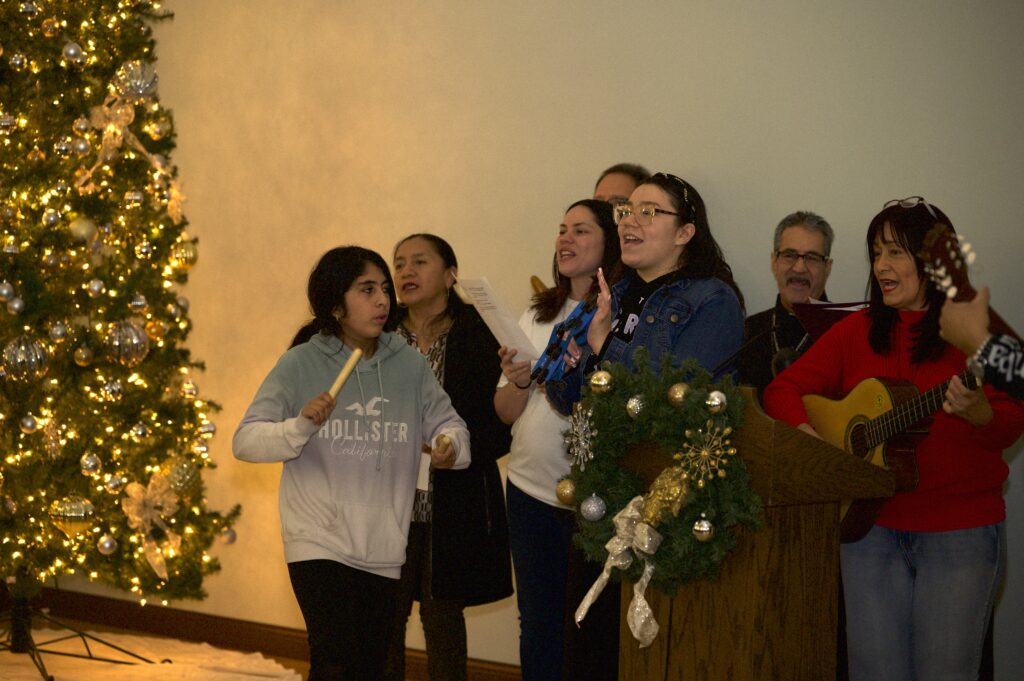
Luego, el Padre Frassati leyó el relato del Evangelio de Mateo (Mateo 1: 18-25) que narra el nacimiento de Jesús: “Este es el evangelio que cuenta el sueño de San José [que no se divorciara de María porque estaba embarazada]”, explicó el Padre.
En su homilía, el padre Frassati señaló que el Evangelio de Mateo da un contexto diferente de cómo José recibió a la Santísima Virgen María en su casa. “Ya sabíamos que José era un hombre justo. El Evangelio, en español, dice que era un hombre sensato y aún así tomó una decisión que habría contradicho lo que José creía que debía suceder [divorciarse de María]. Es un gran ejemplo para nosotros que podamos pensar que somos sensatos y, sin embargo, el Señor todavía nos llama a algo más elevado. Hace que los sensatos sean más sensatos. A veces podemos estar contentos con quiénes somos y con lo que estamos haciendo en la vida y el Señor puede llamarnos a algo más elevado. Él puede ponernos en un lugar más alto, incluso cuando creemos que lo tenemos todo resuelto”, proclamó el padre Frassati.
Después de las oraciones en la iglesia, los participantes regresaron al salón social para la Celebración. “Cuando tenemos Las Posadas, compartimos con la familia y la comunidad,” acotó Hernandez.
Isabel León, coordinadora del Ministerio Hispano en el Centro San Pablo en la Parroquia de San Pablo en Salem, que agrupa a migrantes de varios países hispanos, dijo, “México, Honduras, Chile y otras culturas están trayendo diferentes platos para compartir con la comunidad.”
Los invitados disfrutaron de un buffet que incluía pozole [guiso mexicano elaborado con carne de cerdo y maíz blanco]; tamales; horchata [bebida mexicana hecha con arroz, canela y agua caliente]; ponche [ponche de frutas mexicano elaborado con piña, toronja, manzana y guayaba]; tostadas; pan dulce mexicano; y baliada [plato hondureño de tortillas calientes, frijoles y crema agria].
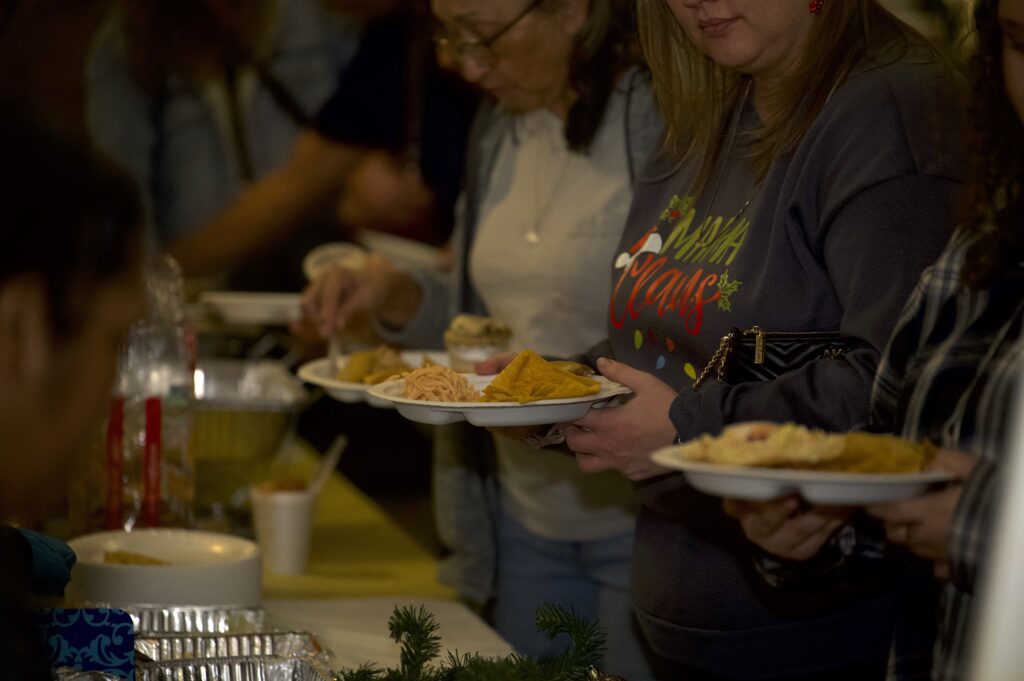
José y Dolores Peralta trajeron un regalo de su tierra natal. “Somos de Ecuador. Chocolate y bananas son algo que tenemos para las celebraciones”, dijo la pareja.
Como es tradicional, La Posada diocesana terminó rompiendo las piñatas.
“La piñata es el corazón de Jesús. Nos cubrimos los ojos porque cuando crees en la luz de Jesús, no importa lo que te pase, vas a seguir la luz de Jesús. Cuando rompes la piñata, es el prisma que Jesús dio su corazón, su amor. Todo lo que tienes en tu vida que es gratis y bueno, es Dios quien te lo dio a través de Jesús”, explicó Hernández sobre la tradición.
Aunque la velada terminó con la primera noche las Las Posadas, las conmemoraciones continuaron todas las noches en Canton, Salem, Ashtabula y Youngstown hasta el 24 de diciembre.
El Padre Ernesto Rodriguez, director del Ministerio Hispano del Condado de Ashtabula en la Parroquia de Nuestra Señora de la Paz dijo que después del evento del 16 de diciembre, la comunidad de Ashtabula continuaría la celebración allí. “Es una forma de mantener vivas las tradiciones de México”, acotó.
El Padre Ernesto dijo que él esperaba alrededor de 40 personas en cada una de las primeras siete noches y alrededor de 100 el 24 de diciembre. “Lo que es importante es recordar el momento en que José y María estaban buscando una posada. Por eso destacamos este viaje. Rezamos el rosario, damos regalos en forma de pequeñas bolsas de dulces para los niños y después de la cena rompemos la piñata,” destacó el Padre Ernesto.
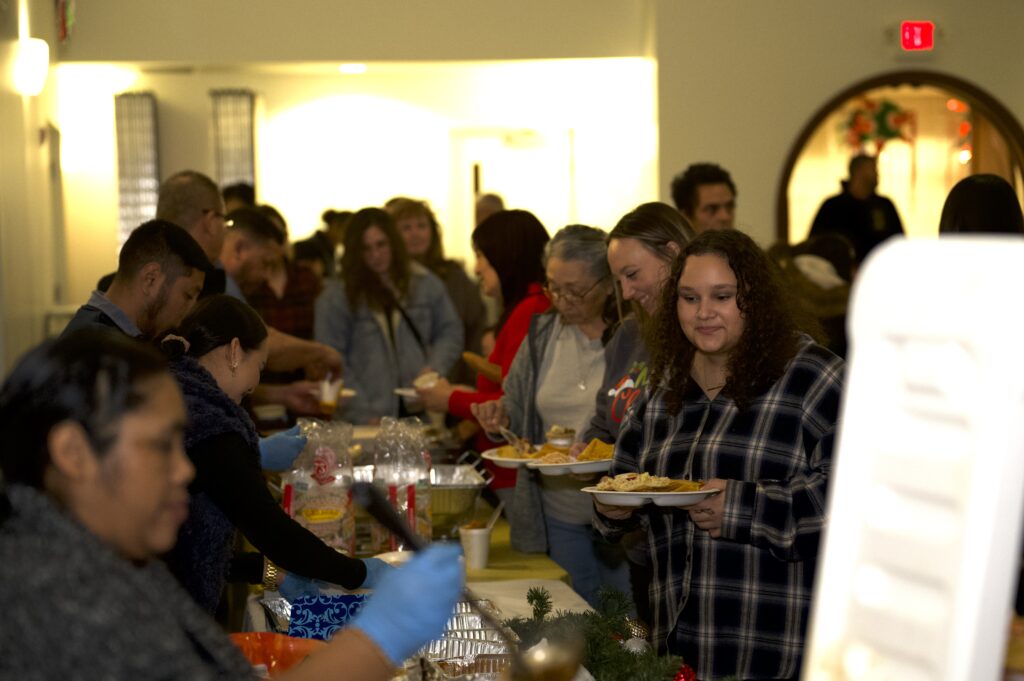
La Hermana Karen dijo que los participantes en Canton también se reunirían cada noche en la Iglesia de San Antonio, tanto como en algunos hogares privados. “Para las celebraciones de la iglesia, cada noche un grupo diferente planifica los cantos, las oraciones y la comida. Tenemos hondureños, guatemaltecos, mexicanos, salvadoreños. Cada país tiene un menú un poco diferente que traerán a la celebración nocturna. Esa responsabilidad compartida es maravillosa”, dijo la hermana Karen.
Ella dijo que tener un evento a nivel diocesano fue maravilloso porque “Las Posadas se hace de manera un poco diferente en cada cultura. Lo hace más rico tener la variedad de celebraciones”.
El componente educativo de la celebración del 16 de diciembre fue importante para Hernández porque “aprender sobre las celebraciones y tradiciones de otras culturas es muy importante para mí como coordinadora diocesana”.
Paulina Montaldo, maestra de español de la escuela secundaria Ursuline y miembro del Consejo Pastoral Diocesano para el Ministerio Hispano, dijo que animó a sus estudiantes a venir a la primera Posada anual para “aprender no solo el idioma sino también la cultura.”
Originaria de Chile, Montaldo llevaba puesto un traje mexicano en honor al evento. “Después de diez años enseñando, es maravilloso ver que el Ministerio Hispano de la diócesis se haga realidad,” agregó.
Entre los estudiantes de español de Ursuline que asistieron al evento se encontraban Alex Miller y Michael Greenwalt. “La señora Montaldo nos anima a conocer lo que hacen las diferentes culturas en Navidad. Entonces, Las Posadas es parte de su patrimonio. Las clases de español han venido a Misa aquí [a la Parroquia Santo Domingo] y ahora a este evento”, dijeron.
Jacki Miller, la madre de Alex, comentó, “Todos aquí son muy acogedores. Yo fui criada católica y nunca supe de esta celebración. Estamos aquí para aprender sobre la cultura.”
El feligrés de Santo Domingo, Agustín Cintrón, formó parte del comité de planificación de Las Posadas. “El Padre [Frassati] nos dijo en qué necesitaba ayuda y lo hicimos. La Parroquia de Santo Domingo es el lugar de la primera celebración anual. El año que viene habrá una en otra parroquia”, afirmó Cintrón.
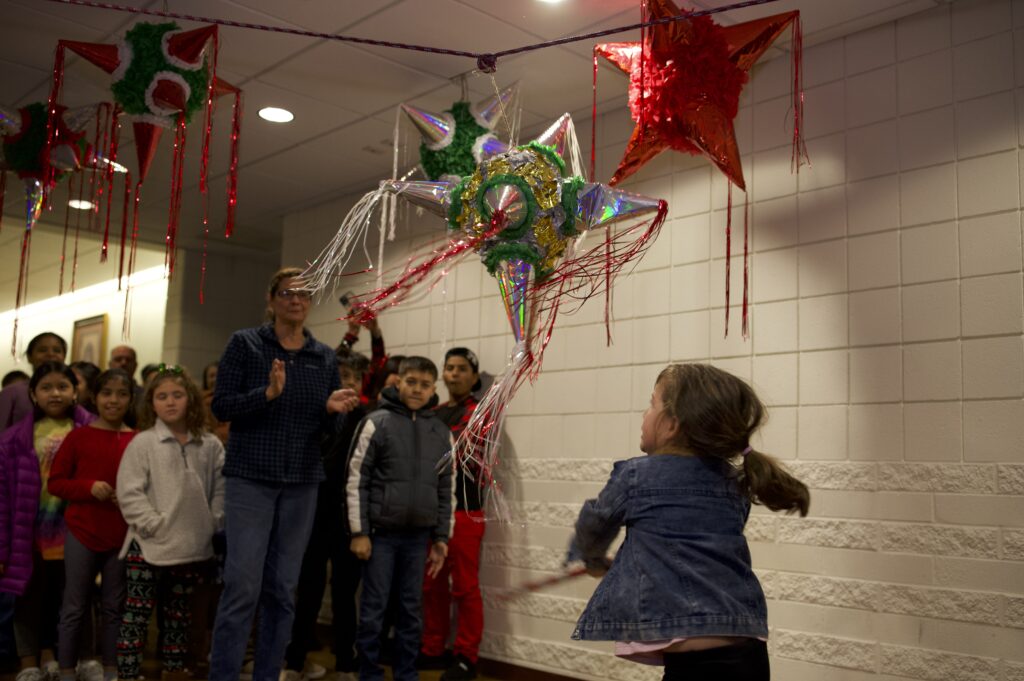
Carmelo Lebron, originario de Puerto Rico, dijo, “Todo el mundo tiene un tiempo para las celebraciones locales, pero ésta es la primera a nivel diocesano. Toda la comunidad se reunirá esta noche. Estamos entusiasmados con esta noche”.
Maria Ziegler, nativa de República Dominicana, nunca había asistido a la celebración de Las Posadas. “Yo era miembro de la Parroquia de Santa Lucía [en Campbell] y ahora pertenezco a Santo Domingo. Comencé a venir a Santo Domingo para la Misa en español y quise venir para aprender sobre Las Posadas,” comentó.
En todo México, las iglesias y comunidades todavían celebran estas festividades con sus elementos religiosos tradicionales. Hoy en día casi cualquier fiesta que se celebra en torno a la Navidad [en México] se llama posada.
The Posada Litany
| En Español | In English |
|---|---|
| Afuera: En el nombre del cielo os pido posada pues no puede andar mi esposa amada. | Outside: In the name of Heaven I beg you for lodging, for she cannot walk, my beloved wife. |
| Adentro: Aquí no es mesón, sigan adelante, yo no debo abrir, no sea algún tunante. | Inside: This is not an inn, so keep going, I cannot open, you may be a rogue. |
| Afuera: No seas inhumano, tennos caridad, que el Dios de los cielos te lo premiará. | Outside: Don’t be inhuman; have mercy on us. The God of the heavens will reward you for it. |
| Adentro: Ya se pueden ir y no molestar porque si me enfado os voy a apalear | Inside: You can go on now and don’t bother us, because if I become annoyed I’ll give you a trashing. |
| Afuera: Venimos rendidos desde Nazaret, yo soy carpintero de nombre José. | Outside: We are worn out coming from Nazareth. I am a carpenter, Joseph by name. |
| Adentro: No me importa el nombre, déjenme dormir, pues que yo les digo que no hemos de abrir. | Inside: I don’t care about your name: Let me sleep, because I already told you we shall not open up. |
| Afuera: Posada te pide, amado casero, por sólo una noche la Reina del Cielo. | Outside: I’m asking you for lodging dear man of the house, just for one night for the Queen of Heaven. |
| Adentro: Pues si es una reina quien lo solicita, ¿cómo es que de noche anda tan solita? | Inside: Well, if it’s a queen who solicits it, why is it at night that she travels so alone? |
| Afuera: Mi esposa es María, es Reina del Cielo y madre va a ser del Divino Verbo. | Outside: My wife is Mary, she’s the Queen of Heaven and she’s going to be the mother of the Divine Word. |
| Adentro: ¿Eres tú José? ¿Tu esposa es María? Entren, peregrinos, no los conocía. | Inside: Are you Joseph? Your wife is Mary? Enter pilgrims; I did not recognize you. |
| Afuera: Dios pague, señores, vuestra caridad, y que os colme el cielo de felicidad. | Outside: May God pay, gentle folks, your charity, and thus heaven heap happiness upon you. |
| Adentro: ¡Dichosa la casa que alberga este día a la Virgen pura. La hermosa María! | Inside: Blessed is the house that shelters this day the pure Virgin, the beautiful Mary. |
| Todos juntos: Entren, Santos Peregrinos, reciban este rincón, que aunque es pobre la morada, os la doy de corazón. | All together: Enter, holy pilgrims, receive this corner, for though this dwelling is poor, I offer it with all my heart. |

